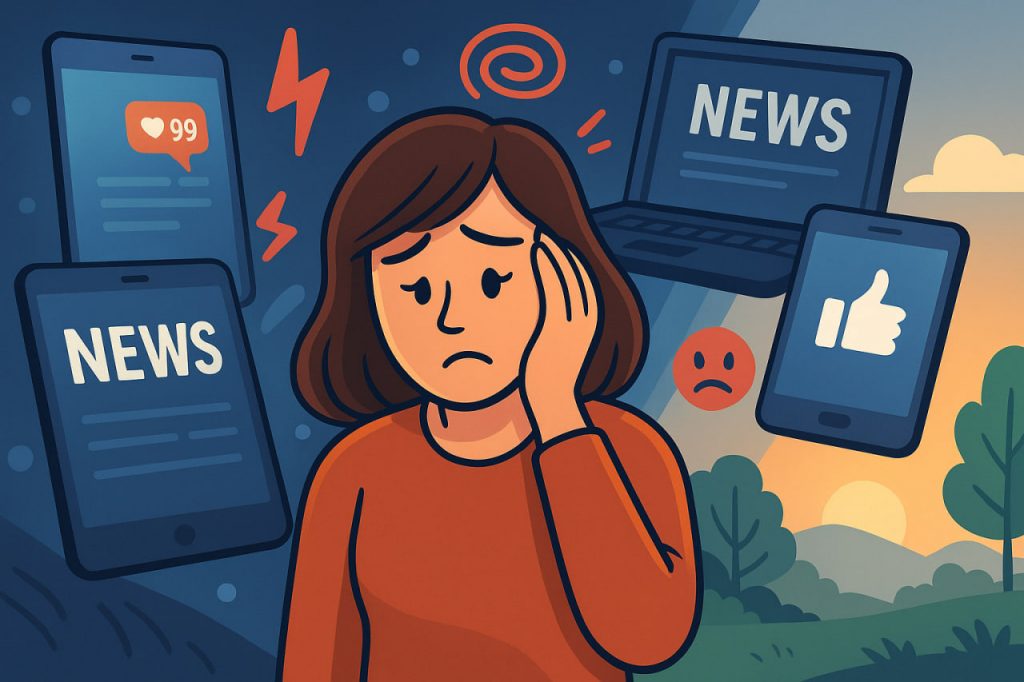In the modern age, mass media has become an inseparable part of daily life. From television and newspapers to social networks and streaming platforms, it informs, entertains, and connects billions of people. Yet behind this powerful communication system lies a hidden cost—its impact on both mental and physical health. Studies from psychologists, sociologists, and medical experts increasingly reveal that overexposure to media can distort perception, increase stress, and contribute to long-term health problems. Understanding these risks is vital for maintaining a healthy balance between information and well-being.
The Psychological Burden of Information Overload
The human brain evolved to process limited amounts of information. However, the digital media landscape bombards people with thousands of stimuli daily—headlines, images, videos, and notifications. This constant exposure leads to information overload, which can cause anxiety, irritability, and fatigue. Neurologists have found that excessive screen time can overstimulate the amygdala, the brain region responsible for emotional reactions, making people more reactive to negative news. The result is a chronic sense of tension and helplessness, often referred to as media-induced stress.
The Spread of Fear and Negativity
One of the most damaging aspects of mass media is its focus on negative or sensational stories. Tragic events, crises, and conflicts attract attention and drive engagement—but they also distort reality. Continuous exposure to such content can lead to a phenomenon known as mean world syndrome, where individuals perceive the world as far more dangerous than it truly is. Psychologists warn that this can contribute to chronic anxiety, sleep disorders, and even depression. Moreover, social media amplifies fear through viral sharing, creating emotional contagion at a global scale.
The Physical Consequences of Screen Dependency
Long hours spent consuming media—especially via smartphones, computers, or televisions—affect physical health as well. Extended screen exposure can cause eye strain, headaches, and musculoskeletal pain from poor posture. The blue light emitted by screens disrupts the body’s circadian rhythm, leading to insomnia and reduced sleep quality. Lack of restful sleep, in turn, weakens the immune system and increases risks of obesity, diabetes, and cardiovascular diseases. Health experts emphasize that the brain perceives prolonged digital stimulation as a form of low-level stress, which can elevate cortisol levels over time.
The Influence on Self-Perception and Mental Health
Mass media also shapes how individuals see themselves and others. Constant exposure to idealized body images, luxury lifestyles, and filtered perfection creates unrealistic standards. This comparison culture can harm self-esteem, particularly among adolescents and young adults. Research links heavy use of social media platforms like Instagram and TikTok with rising rates of body dysmorphia, eating disorders, and depression. Furthermore, the pressure to present a perfect life online generates emotional dissonance—a gap between reality and digital identity—that increases loneliness and dissatisfaction.
The Problem of Misinformation
Health misinformation has become one of the most serious threats to public safety in the digital era. False claims about diets, miracle cures, or medical treatments can lead people to make harmful decisions without consulting professionals. During global crises, such as pandemics, misinformation spreads faster than verified data, undermining trust in science and healthcare systems. Experts at the World Health Organization (WHO) refer to this as an “infodemic”—a flood of false or misleading content that complicates public understanding and response.
Expert Perspectives
According to Dr. Sherry Turkle, a psychologist at MIT, “We are connected but alone.” She emphasizes that constant digital interaction replaces deep conversation with superficial engagement, eroding empathy. Neuroscientist Dr. Andrew Huberman highlights the brain’s sensitivity to visual and emotional stimuli, warning that repeated exposure to distressing media rewires neural circuits linked to focus and mood. Meanwhile, sociologist Dr. Douglas Rushkoff argues that media companies exploit human attention, using algorithms to maximize screen time—often at the expense of mental health.
Finding a Healthy Media Balance
The solution lies not in rejecting media but in managing its use consciously. Experts recommend digital hygiene—limiting screen time, turning off notifications, and setting specific periods for consuming news. Practicing mindful media consumption means verifying sources, avoiding sensationalism, and seeking positive or educational content. Taking regular breaks from screens, especially before bedtime, helps restore natural sleep cycles. Engaging in offline activities—reading, walking, or socializing face-to-face—rebalances mental and emotional health.
Social Responsibility and the Role of Education
Society must also address the systemic causes of media harm. Governments and educators can promote media literacy programs that teach critical thinking and fact-checking. Journalists and content creators hold ethical responsibility to report truthfully and minimize psychological harm. By fostering awareness, empathy, and scientific accuracy, the media can evolve into a tool for empowerment rather than manipulation.
Interesting Facts
- The average person spends over seven hours a day consuming media.
- Exposure to negative news can raise stress hormone levels by up to 30%.
- Around 40% of social media users report worsened mood after browsing platforms.
- Blue light from screens suppresses melatonin, delaying sleep by up to 90 minutes.
- The WHO classifies misinformation as a global health risk alongside pandemics.
Glossary
- Information Overload – The psychological strain caused by excessive data intake.
- Amygdala – The brain region controlling fear and emotional response.
- Circadian Rhythm – The body’s natural 24-hour biological sleep-wake cycle.
- Mean World Syndrome – The belief that the world is more dangerous than it actually is, caused by media exposure.
- Body Dysmorphia – A mental disorder involving obsessive focus on perceived physical flaws.
- Infodemic – A flood of misinformation that spreads rapidly through media platforms.
- Cortisol – A hormone released during stress that affects metabolism and immunity.
- Media Literacy – The ability to critically analyze and evaluate media messages.
- Digital Hygiene – Healthy habits that minimize the negative effects of digital media use.
- Emotional Dissonance – The discomfort caused by a mismatch between real life and one’s digital self-image.


